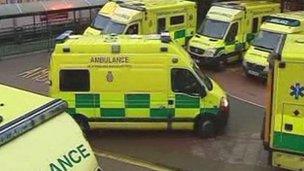Obesity expert wants fatty foods tax in Wales
- Published
An expert on obesity has called for a tax on fatty foods to help reduce the number of overweight people in Wales.
Dr Nadim Haboubi runs a weight management clinic and has advised on government strategy to tackle obesity.
The Welsh government said it does not have the power to levy tax.
The Welsh Ambulance Service has spent more than £3m adapting 42 ambulances to carry obese patients, figures for BBC Wales reveal.
It also has eight bariatric ambulances for moving obese patients. They include room for an extra-wide stretcher and a winch.
When the service announced the fleet of eight special vehicles three years ago, it said it had seen a 25% increase in obese patients.
Figures obtained under the Freedom of Information Act also show that fire services in Wales have been called 271 times to help move obese patients in the past three years.
Of those calls, 149 were to South Wales Fire and Rescue Service, 104 to Mid and West Wales Fire and Rescue Service and 18 to North Wales Fire and Rescue Service.
Dr Haboubi, a consultant in gastroenterology, runs a specialist clinic in Ebbw Vale.
He says he regularly sees people who are overweight, to the point where they risk serious health problems.
He wants a tax on fatty foods, making them more expensive, as well as subsidies to make healthier foods cheaper.
Earlier this month, Denmark became the first country in the world to introduce a fat tax, which is imposed on foods containing more than 2.3% saturated fat.
Before the price rises, some people hoarded foods like butter, pizzas, and meat.
According to the latest available figures - the Welsh health survey, 2008 - 21% of people in Wales were obese.

The Welsh Ambulance service has 42 ambulances which have been adapted to hold obese patients
Dr Haboubi said: "Why don't we have subsidy on the healthy foods, on organic food, on vegetables, on fruit, on low-fat food?
"Why don't we put tax on unhealthy food? Like the way we do on cigarettes and alcohol."
He said such a tax would need to involve government, supermarkets and health professionals, adding: "Everybody should be involved in this exercise."
Seven local health boards in Wales have spent more than £450,000 on bariatric beds - capable of holding patients weighing up to about 70 stones - in the past three years.
'40 stone casualty'
Dave Morris, a group manager with the south Wales fire and rescue service, said: "Some of the incidents that the fire and rescue service attend can be quite complex and they can vary from just assisting the ambulance service in lifting a 30 to 40 stone casualty from the floor on to a stretcher.
"But on occasions we can have the added problem of a person being stuck in a bath, on a toilet, on a commode and this can require us setting up quite elaborate pulley systems to ensure that that person is raised in a controlled fashion and then put on to a stretcher or back into a bed."
Mr Morris said all his officers are trained to help obese patients from their homes to hospital - now a routine part of the rescue service offered.
Health Minister Leslie Griffiths did not want to be interviewed, but the Welsh government said in a statement it did not have the power to levy tax.
It said: "However we are open-minded on the case for further reform, including the possibility of devolving some tax-varying powers.
"However, any move towards tax devolution would only be worthwhile as part of a coherent package of reforms that also included real change in our priority areas of fairer funding and borrowing powers."
It added: "As referenced in the chief medical officer's recent annual report, we recognise that obesity is a growing problem in Wales and one that we are actively addressing."
- Published13 October 2011
- Published1 October 2011
- Published16 August 2011
- Published3 February 2011
- Published31 March 2011